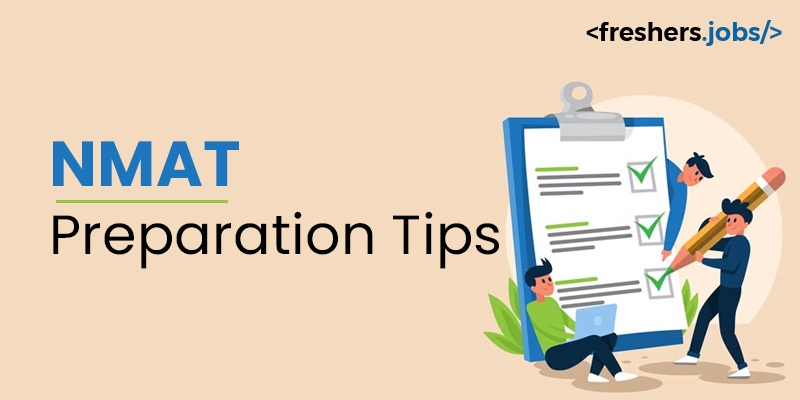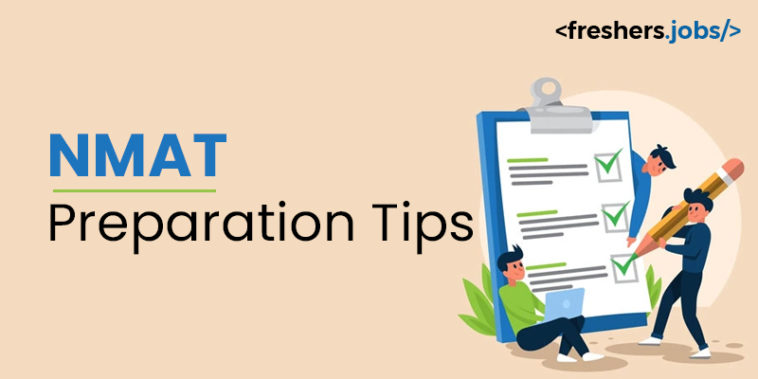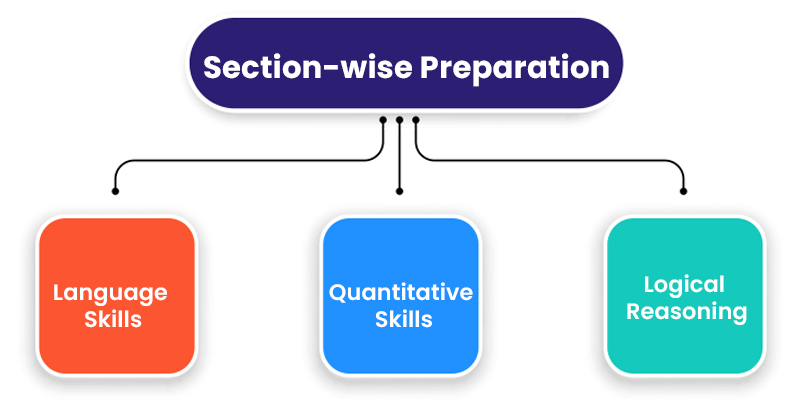NMAT Exam is also called the NMIMS (Narsee Monjee Institute of Management Studies) Management Aptitude Test. It is a computer-based exam conducted by GMAC. With proper preparation strategies and time management skills, scoring good marks in NMAT Exams is easy. The NMAT exam is one of the moderate exams compared to other MBA entrance exams.

Over 55 to 75 lakhs of applicants take up NMAT Exams yearly. NMAT Exam scores are used as criteria to select candidates for MBA admissions or other management programs in certain Business schools. Let’s explore the preparation strategies for freshers jobs seekers to excel in the NMAT.
NMAT Exam
NMAT (Narsee Monjee Management Aptitude Test) is a popular MBA entrance exam in India that is conducted to select eligible candidates to provide admission to various management programs offered by leading B-Schools and management institutes in the country. GMAC conducts it, also called the Graduate Management Admission Council. NMAT is accepted by several top MBA colleges in India, including NMIMS Mumbai, SPJIMR Mumbai, ISB (Indian School of Business), XIMB, and many others. NMAT exam scores are considered criteria for admission to MBA or other management programs in some prominent Business schools. Each institute may have its cutoff scores and selection criteria, so candidates need to check all the specific requirements of the schools they are interested in. Let’s discuss the structure of NMAT.
Candidates looking for job vacancies in JP Morgan can visit JP Morgan Jobs for freshers.
NMAT Exam Pattern
NMAT is an online mode exam with a total duration of 120 minutes and 108 questions. The test comprises three sections:
- Language Skills Section, with a duration of 28 minutes.
- Quantitative Skill Section, with a duration of 52 minutes.
- Logical Reasoning Section, with a duration of 40 minutes.
All the questions will be presented in a multiple-choice format with four choices for each question. Each section comprises 36 questions, amounting to a total maximum score of 360.
If you are looking for job openings in Chennai, visit freshers jobs in Chennai.
Preparation Strategies
- The first step in NMAT Preparation is to start understanding the exam pattern.
- Please familiarize yourself with the NMAT exam syllabus, and ensure you keep track of it. It will benefit you to analyze how many topics you have covered and how many are yet to be covered. Identify your more substantial areas with weaker areas so that you can prioritise the weaker areas to improve your understanding and score well.
- Enrol yourself in an online coaching class for NMAT to better understand the concept.
- You can also perform a SWOT analysis called Strengths, Weaknesses, Opportunities, and Threats to improve conceptual understanding and analyze the syllabus’ internal and external factors to find learning criteria for improving your focus during the preparation.
- Improve your mental calculation skills to solve problems.
- Try solving as many previous year’s question papers to gain knowledge about how the questions are asked in the NMAT exam.
- Make notes of essential formulas so that it will be easy to glance at or revise at the last minute.
- Focusing on your time management skills during the exam preparation is essential. As there are a lot of topics to cover, it is advisable to schedule your time accordingly and focus on how much time you are taking to solve a question since uneven time can result in a shortage of time during the exam.
- Attending Mock tests is a crucial factor to get a better understanding. It will help you to practice solving a problem on time and also help you in analyzing your performance level.
- It is essential to prepare well for the exam, but it is also necessary to take breaks during the NMAT preparation and let your brain relax for a while. Taking short breaks will help you to develop your focus and patience to sit still for the 2 hours exam.
Section-wise Preparation
A proper NMAT preparation strategy is essential because it will be helpful for you to analyze your strengths and weaknesses. Based on this analysis, you can improve your speed of learning to acquire insights in your weaker areas.
Language Skills
A critical aspect of the NMAT preparation strategy for language skills is reading. Develop a regular habit of reading articles about technology, psychology, sociology or daily newspapers. Regular reading habits will improve your reading speed. Write down all the information that you read. Once you feel that your reading skills have improved, you can start summarizing the information in your mind. This process will help you to revise during your NMAT preparation. Vocabulary plays a vital role in the Language skills section of the NMAT Exam. So, note down all the new and unfamiliar words you come across while reading and research the meanings and synonyms for those words. Improve your grammar and take mock tests. Work on your strong and weak points to work on them.
Quantitative Skills
Start the Quantitative skills preparation for NMAT from the basics. It is vital to focus on calculations. It is essential to be well-prepared in speed and vedic math. Don’t rely more on a calculator, especially for basic calculations. Give more priority to concepts like Geometry, Profit and loss, speed and distance, successive percentage, Ratio and Proportion. Ensure you attend 2 to 3 mock tests every week to understand the exam pattern better and have a weekly revision.
Logical Reasoning
The first step for preparing a strategy for the Logical Reasoning section is to focus on the pictorial representation. You have to practice questions that help you improve your prediction analysis. It is essential to read and understand the question carefully. It is advisable to note down the data you obtained from the question separately. It helps you to avoid revisiting the set again and again. The Logical Reasoning paper is unpredictable since it has no proper syllabus. It is essential to focus on words such as “all”, “some”, and “none” while you are reading the facts during the examination. Stop assuming and select an option that you are 100% confident about. Learning how to select the proper Logical Reasoning sets in the NMAT exam is very important. Analyze the questions, whether they are easy or complicated and solve them accordingly.
Books to prepare for the NMAT Exam
Essential books to prepare for the NMAT Exam are listed below.
- Quantitative Aptitude – by R.S. Aggarwal.
- How to Prepare for Data Interpretation for CAT? – written by Arun Sharma.
- Data Interpretation and Logical Reasoning for CAT – written by Nishit K. Sinha.
- Preparation tips for Logical Reasoning for CAT – written by Arun Sharma.
- Word Power Made Easy by Norman Lewis.
- Analytical Reasoning by M.K Pandey.
How to prepare for NMAT in a limited time?
The preparation strategies for NMAT will differ depending on how much time is left for the exam. The strategies below are tips for preparing for the NMAT Exam in a limited time. Imagine that you have six months left for your NMAT Exam. All you need to prepare for it is an intelligent preparation strategy. The first step is to divide the 6 months into 3 phases.
- Allot Phase 1 for covering all the NMAT syllabus.
- Attend mock tests and practice solving sample question papers.
- Revise all the topics.
It is advisable to allot 3 months to cover the NMAT exam syllabus completely. Make sure that you are thorough with all the topics. Spend more time covering the topics that you find difficult. But always remember to complete every topic and then move to the next one. Also, ensure that you don’t study more than one topic in a section simultaneously. Prepare each topic one by one. Ensure you are clear with the concept of a specific topic and then move to the next one.
In Phase 2, spend 2 months solving NMAT mock tests and Previous year’s question papers. Practicing at most minuscule 30 mock tests and sample question papers is advisable. It will help you to analyze your performance level after solving each mock test, help you to analyze your preparation level, and also help you plan the preparation strategy accordingly.
In Phase 3, spend the last month revising all the topics. You should completely revise all the chapters, concepts, important formulae, and theorems. This approach is the last step of your preparation, and once all the preparation steps are followed correctly, you will be entirely prepared for the NMAT exam.
In conclusion, NMAT is an essential exam for candidates aspiring to pursue an MBA or other management programs in India. Remember that success in the NMAT requires knowledge, determination, confidence, and intelligent and focused preparation. In this blog post, we’ve covered a range of preparation tips and strategies to help you prepare for the NMAT.




